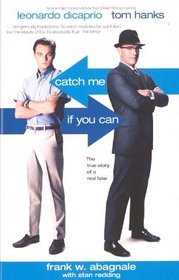Helpful Score: 2
Having greatly enjoyed the movie of the same name, I thought it would be interesting to read this autobiographical memoir of Frank Abagnale's years on the run from the law. However, while truth is sometimes stranger than fiction, the fictionalized account that Leonardo DiCaprio and Tom Hanks brought to life in the film adaptation was much more entertaining and intriguing, and certainly more deserving of the title "Catch Me If You Can".
If you've seen the movie, you'll recognize the main plot. Frank runs away from home at the tender age of 16 after his parents divorce and poses as a Pan Am pilot to earn free flights and, more importantly, make his fraudulent checks seem more believable. Additionally, the book delves more deeply into Frank's so called "addiction" to the ladies, often stewardesses. He does settle down at times, posing as a doctor, a lawyer, and a sociology professor, all through the use of faked credentials. It is interesting to see exactly how he accomplished all this (and there were a few close calls), though he does repeat himself at times.
Unfortunately, what's missing from the book is the best part of the movie, namely, the other side. The FBI is mentioned regularly, but we don't get to see what they're doing to try to catch Frank. There are no Christmas phone calls or, really, any major interactions between FBI agent O'Reilly and young Frank until the afterward. While there is still some excitement in the chase (yes, he really did escape custody through an airplane toilet), it mostly comes from close calls and self-imposed ethical conflicts on Frank's part.
The book was originally published in 1980, and, obviously, airport security is much more stringent now. Additionally, the fear of identity theft has become more mainstream in the last decade. In an "interview with the author" after the epilogue, some of these points are addressed, but the big picture is left incomplete. I am unsure if security issues prohibited Mr. Abagnale from delving into more detail in terms of check security measures he helped create, or if it was merely a case of him creating them after the original publication. Either way, the book still stands without it, but it would be much more powerful and relevant with it.
In my opinion, while not an awful book by any means, I suggest that you save your money and just rent the movie instead. Keep in mind that it's only about 80% true, but that other 20% really ties the plot together and provides at least 50% of the entertainment.
If you've seen the movie, you'll recognize the main plot. Frank runs away from home at the tender age of 16 after his parents divorce and poses as a Pan Am pilot to earn free flights and, more importantly, make his fraudulent checks seem more believable. Additionally, the book delves more deeply into Frank's so called "addiction" to the ladies, often stewardesses. He does settle down at times, posing as a doctor, a lawyer, and a sociology professor, all through the use of faked credentials. It is interesting to see exactly how he accomplished all this (and there were a few close calls), though he does repeat himself at times.
Unfortunately, what's missing from the book is the best part of the movie, namely, the other side. The FBI is mentioned regularly, but we don't get to see what they're doing to try to catch Frank. There are no Christmas phone calls or, really, any major interactions between FBI agent O'Reilly and young Frank until the afterward. While there is still some excitement in the chase (yes, he really did escape custody through an airplane toilet), it mostly comes from close calls and self-imposed ethical conflicts on Frank's part.
The book was originally published in 1980, and, obviously, airport security is much more stringent now. Additionally, the fear of identity theft has become more mainstream in the last decade. In an "interview with the author" after the epilogue, some of these points are addressed, but the big picture is left incomplete. I am unsure if security issues prohibited Mr. Abagnale from delving into more detail in terms of check security measures he helped create, or if it was merely a case of him creating them after the original publication. Either way, the book still stands without it, but it would be much more powerful and relevant with it.
In my opinion, while not an awful book by any means, I suggest that you save your money and just rent the movie instead. Keep in mind that it's only about 80% true, but that other 20% really ties the plot together and provides at least 50% of the entertainment.
Helpful Score: 2
I loved this book from start to finish. The book keeps you hooked from start to finish with a fast-moving storyline and lots of imagery of faraway places and unique characters. I read this book after watching the Stephen Spielberg film and feel like I missed out on a lot of great stories not included in the movie. This book satisfies the conman side of ourselves without having to actually commit a felony!
Helpful Score: 1
This story was absolutely amazing. An autobiography by Frank Abagnale Jr about his escapades as check fraud throughout the ages of 16 and 21 was hilarious, captivating, and thought provoking. This is without a doubt one of my favourite books!!!
Helpful Score: 1
Really great book. A must read even if you saw the movie. The movie cut many good parts out. Incredible but true story.




